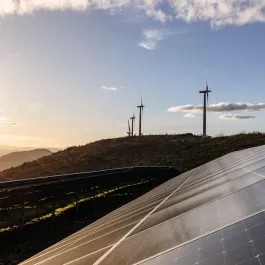
EDP reinforces decarbonization targets by reducing 98% of emissions by 2030

EDP's new and more ambitious target has now been recognized by the Science Based Target initiative, in line with the demands of climate science, and is a relevant contribution to containing the increase in the planet's average temperature to 1.5ºC.
EDP raised the bar in the decarbonization process by reinforcing its environmental targets up to 2030: the company will reduce specific CO2 emissions by 98% up to 2030 (compared to the levels of 2015), reinforcing its commitment to the previous goal, which was 90% for the same period. Another reinforced target involves indirect CO2 emissions, which will also decrease 50% by 2030. This ambition is supported by the growing production of energy from renewable sources – which, in this first semester, already represents 81% of the electricity generated by EDP –, in parallel with the progressive deactivation of the group's coal-fired power stations.
The review of EDP's carbon neutrality targets has now been validated by the Science Based Target initiative (SBTi), an organization that evaluates and approves companies' initiatives for a low-carbon economy and for climate change fighting. In this assessment, SBTi also recognizes that EDP's decarbonization strategy is in line with the trajectory defined by science, which aims to contain the increase in the global average temperature by 1.5°C.
This is a commitment that the company had already made in 2019, when it signed up to the Business Ambition for 1.5ºC initiative, promoted by the United Nations. In this context, EDP has committed to establishing a CO2 emission reduction target, consistent with what climate science defines as necessary to limit global warming to the most demanding level of the Paris Agreement.
With these commitments, EDP consolidates its ambition of being 100% green up to 2030 and completely carbon neutral up to 2030, as foreseen in its most recent strategic plan. An ambition that includes, among several goals, investing 24 billion euros in projects that contribute to the energy transition, and doubling the production capacity of wind power and solar over the next five years. EDP believes that these contributions will be decisive in fighting climate change and promoting carbon neutrality in a more sustainable planet.
SBTi is a non-governmental organization (NGO), born out of the collaboration between the Carbon Disclosure Project (CDP), the UN Global Compact (UNGC), the World Resources Institute (WRI) and the World Wide Fund for Nature (WWF). Its objective is to mobilize companies to set goals with levels of ambition aligned with science and, thus, promote an accelerated transition to a low-carbon economy. This organization is already an international reference in the assessment and approval of reduction targets in line with climate science. EDP, together with other companies in the sector, participated in the preparation of the Setting Science-Based Targets guide: A Guide for Electric Utilities, published by the World Business Council for Sustainable Development (WBCSD), with the aim of helping companies in the electricity sector to establish reduction targets in line with indicators validated by science.




